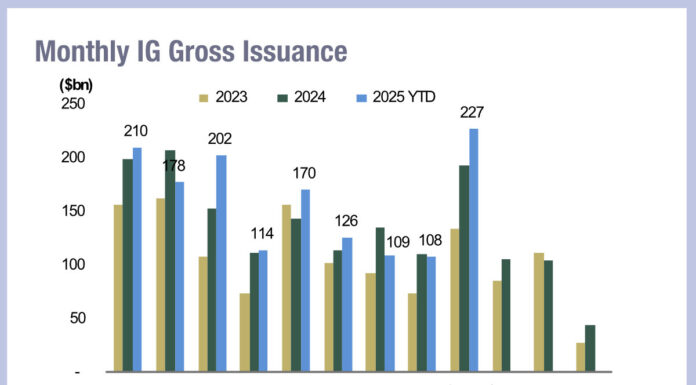By Pia Hecher.
The Federal Reserve’s Treasury Market Practices Group (TMPG), which discusses issues in the US government bond market, has said that firms are increasingly exposed to counterparty risk through bilateral clearing of trades with firms, and may not be sufficiently considering the indirect credit risks to which they are exposed through their counterparties.
It warned, “Participants should avoid the temptation to conflate asset quality with counterparty creditworthiness.”
In its ‘White Paper on Clearing and Settlement in the Secondary Market for U.S. Treasury Securities’ the TPMG writes, “There have been instances in the past in which Treasury market participants have suffered substantial and rapid losses from unexpected counterparty credit concerns and leveraged positions.”
US Treasuries are usually traded in secondary markets between dealers and customers, or over interdealer broker (IDB) platforms. In the past, platform participants were all broker and members of the central counter party (CCP), which clears trades centrally and assumes counterparty credit risk. Non-CCP members began joining IDBs in 2000, and today three-quarters of IDB trades clear bilaterally, according to TPMG data.
The Group’s has expressed concern about risks in clearing and settlement processes connected to the increase of automated electronic trading and the decrease of centrally cleared trading. Whether in an IDB or dealer-to-customer setting, it argues that bilateral clearing leaves credit risk with trading counterparties until settlement and entails less standardised and transparent risk mitigation practices.
Problems may arise through an insufficient understanding of the role of IDB platforms amongst users, and of the distribution of counterparty credit risk. In addition, TMPG argues that risk management needs to keep up with an increase in high-speed trade execution. Firms should also be prepared for operational disruptions like cyber-attacks.
The majority of IDB electronic activity and associated market data is currently generated by one IDB, Brokertec, and the TPMG notes it is unclear how users would react if the platform became unavailable. Moreover, CCPs have no insight into members’ bilateral activities and face indirect credit risk from members and non-members.
Another resiliency issue is participant understanding of credit enhancement processes by third parties. Bilateral agreements exist where clearing entities temporarily extending credit can suddenly limit or terminate the agreement, making risk management for unprepared participants challenging.
TMPG adds that in dealer-to-customer trading, non-electronic trading may cause delays in trade matching. To manage exposure risks, bilaterally cleared trades require effective matching techniques. TMPG also warns that liquidity risk management practices in the Treasury cash market should take a trade’s gross value into account, as its notional value is required for settlement.
The consequences of not recognising risks are potentially grave, TMPG reports. Default management processes of non-CCP members vary and are not transparent. If a large participant in the US Treasury defaults, counterparties could be left with a short securities position to cover, causing a flight to quality and an increase in security prices, which happened after the Lehman failure in 2008.
©Markets Media Europe 2025












